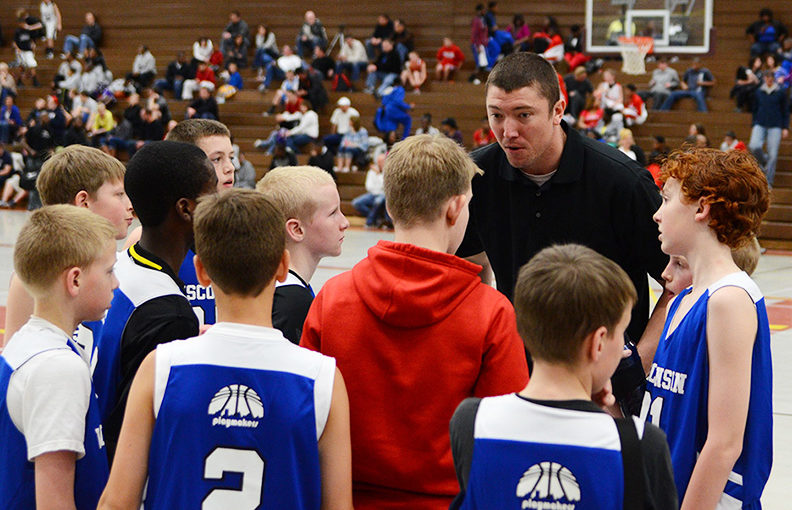8 keys to coaching Millennial athletes
Are today’s athletes different than years past? Do you at times feel a little disconnected from the current generation? If you are like many coaches, teachers and parents, you sense that today’s generation is a bit different.
 Fortunately, you don’t necessarily need to be up on all the latest catch phrases, yet you must understand what makes today’s generation of athletes tick and coach them accordingly.
Fortunately, you don’t necessarily need to be up on all the latest catch phrases, yet you must understand what makes today’s generation of athletes tick and coach them accordingly.
They’re special
As a group, Millennials have been taught that they are special and vital to the success of their family, team and community. They have received an unprecedented amount of focus and attention from their parents and other adults, so they naturally feel that they are entitled to the best.
They’re sheltered
Most Millennials have been protected and sheltered from birth. They have had a multitude of laws and gadgets designed to protect them from the many harms and dangers of the world.
While this sheltering has created a generation that is much healthier and less prone to injury, it has also prevented them from experiencing, learning from, adapting to and overcoming the important and inevitable challenges of life. Because of this sheltering, many are crushed when they receive less than an “A” for a grade, don’t get a ribbon for coming in ninth place, get cut from teams or receive negative feedback. It’s as if they’ve rarely received any criticism and subsequently don’t know how to handle it.
They’re confident
According to the authors’ polls, Millennials tend to be a more confident generation when it comes to their abilities to achieve. While many of them believe they can achieve anything, they sometimes forget that success is not going to come instantly but must be worked at consistently and is anything but a linear journey.
They’re team-oriented
Millennials are the most interconnected generation yet. Between emailing, texting and social media, peer networks are a huge part of their daily experiences. They have strong team instincts and like to stay connected with their social groups on a regular basis.
They’re conventional
Rather than the usual rebellious teen years, Millennials tend to embrace the more traditional values of their parents. They are much less likely to use alcohol, tobacco and marijuana than the generations before them.
Howe and Strauss write, “Millennials describe closer ties with their parents than teens in the history of postwar polling.” Many are in continual contact with their parents.
They’re pressured
Because of the increased competitiveness for grades, school admissions and jobs, today’s Millennials feel much more pressure to succeed than generations before them. They believe the stakes are high and the price of mistakes are more consequential than in the past.
Many of them are overscheduled and overwhelmed from childhood with private lessons, camps and tutors, all designed to help them try to get ahead of the ever-increasing global and local competition.
They’re achieving
With higher standards, Millennials are very focused on achievement and “are on track to becoming the smartest, best educated adults in U.S. history” according to Howe and Strauss. Their test scores are continually rising and more of them are focused on going to college than ever before. They have a strong need to achieve.
The authors make the case that everyone from college professors, admissions officers, high school teachers, school administrators, employers and coaches all must understand these seven differences that make the Millennial generation different than the Gen X, Baby Boomers and others who came before them.
I hear a lot of coaches say that today’s athletes seem more fragile because they are sheltered and protected from many of the natural disappointments in life. It also seems that many of the Millennials think that today’s “instant gratification” society also applies to athletics. They think that they can master skills in a short period of time without going through the natural and time-consuming process that it takes to learn and master a complex sport skill.
Coaches also realize that Millennials are much more influenced by their parents in comparison to past generations. Not only have children changed, but parents have become much more involved and sometimes intrusive in their children’s sports.
With today’s media-obsessed society, many Millennials have extremely short attention spans if you are not physically or mentally engaging them in some type of activity.
Advice for coaching Millennials
Based on the changes outlined by the authors of Millennials Go To College and the ones observed by coaches, here are some tips to help you coach Millennials.
1. Help Millennials understand adversity. Adversity is inevitable, temporary and helpful in the long term. Because many Millennials don’t handle failure well, you should invest the time to show them how to handle it productively. You need to teach your athletes how to maintain their composure and confidence, and how to refocus on to the next play.

2. Teach them improvement takes time. Help them create long term training schedules that take them from where they are now to where they would like to be. Encourage them to make the choice to stick with their plan over the long run. Remind them that success takes a long term investment of time.
3. Exercise patience. Understand that there are dozens of things that compete for your Millennials’ attention and time. Don’t get frustrated when your athletes are involved in a multitude of other activities. Make your sport and team one that they enjoy being a part of and see real gains when they participate. If you can do this, they will gravitate to you.
4. Don’t lecture — ‘Edu-tain.’ Short attention spans are a hallmark of the Millennial generation because of the fast-paced world of technology. They have hundreds of television channels to choose from and billions of ways to instantly communicate with friends. You too must try to build in the entertainment factor when you coach or you quickly lose their focus. Make drills short, interesting and competitive to hold their interest.
» ALSO SEE: The dangers of elitism with young athletes
5. Provide opportunities to engage in free athletic play. I tried something I called “Free-Play Fridays.” I piled a bunch of sports equipment in the back of our mini-van and drove to a local park. We invited two dozen of my 9-year-old son’s friends and acquaintances to join us for a morning of free play. The kids could choose whatever sports and activities they wanted. They make up the teams and have fun on their own in a minimally supervised environment. I was there merely to keep them safe and to attend to any injuries that might occur.
Despite having low turnout, the kids got a chance to experience sport without the pervasive, well-meaning interference of adults.
6. Develop parents into allies, not adversaries.Because Millennials and their parents are typically more connected than previous generations, you need to find ways to include them rather than fight them. By reaching out to your parents and coaching them on what is appropriate and what isn’t, you have a better chance to turn them into allies than adversaries.
7. Help kids fight their own battles. Along with the parent issue, many athletes try to have their parents fight their battles for them. Instead, encourage your athletes to constructively fight their battles on their own first. Teach them how to maturely approach conflict and how to work through it effectively. These conflict management skills will be vital for them as they have families and businesses of their own.
8. Remember that people are people. Even though there are differences from years past, ultimately remember that people are people. Make your practices engaging. Challenge them to improve. Build their confidence. Support them when they struggle. Do this, and you too will have a great time coaching athletes of all ages and watching them get better.
2 thoughts on “8 keys to coaching Millennial athletes”
Leave a Reply
You must be logged in to post a comment.






The only problem with this is that the youngest millennials are not in their early-20s.
Current teenagers are not Millennials, their the iGeneration.
Thanks. The precise definition of ‘Millennial’ is a matter of debate. Many studies define them as now aged in their early 20s, while the U.S. Census Bureau defines ‘Millennial’ as anyone born between 1982-2000, which would make some ‘Millennials’ about 17/18 years old. Either way, the tips still apply to a lot of athletes today.